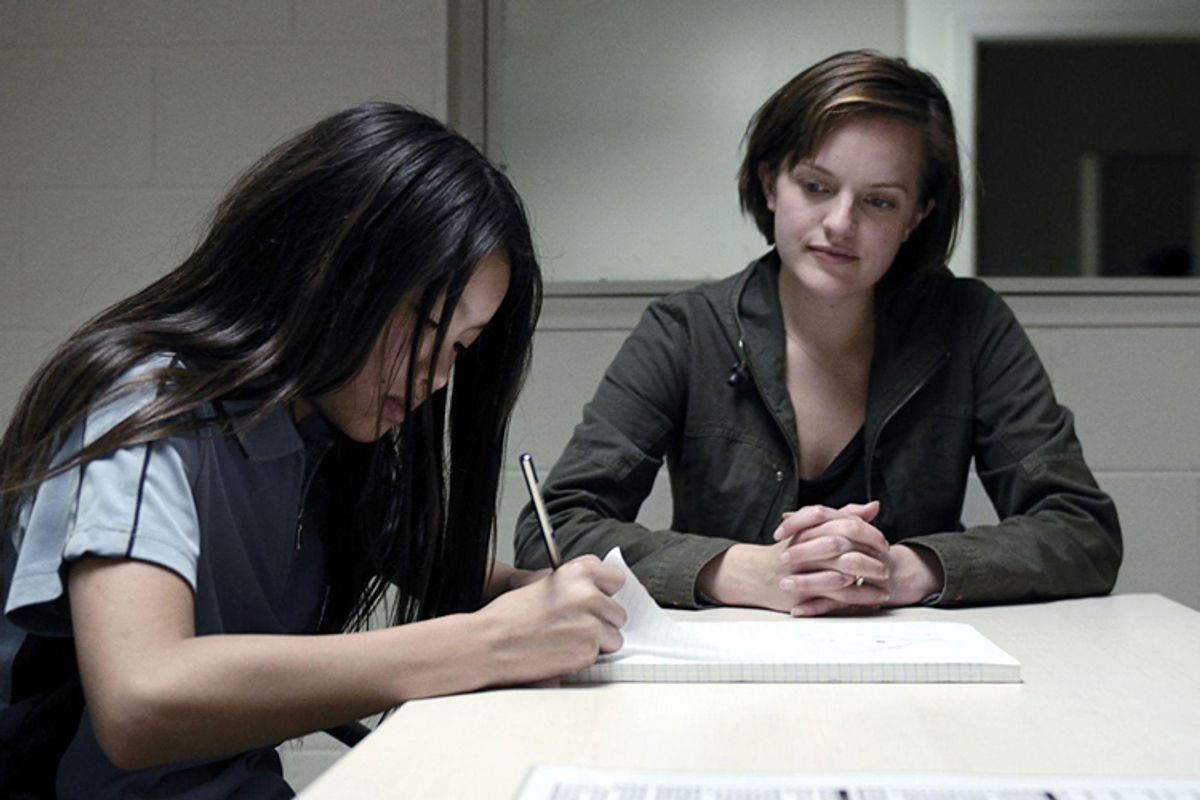The stupendous Jane Campion-Elisabeth Moss collaboration “Top of the Lake” finished on the Sundance Channel last night: if you haven’t seen it yet, what are you waiting for? If you have, you know that the last two hour installment masterfully wrapped up the series major mystery without forgoing its lyrical, steady tone. A dramatic and vast shot of a teenage boy plummeting off a cliff was balanced with scenes of that same teenager and his friends having an outdoor slumber party, that same teenager comforting his friend by cutely demonstrating how a baby might worm its way out of the birth canal. The small moments were not drowned out by the large.
We now know who impregnated the 12 year old Tui, or at least the circumstances under which she was impregnated. The police chief Al, a strange guy who has never shown that much urgency about the rape, who kept hitting on his colleague Robin (Moss), who was pretty chummy with Tui's father and town druglord Matt, but who seemed harmless enough, was actually running an underage sex ring. This reveal made sense of many things— no wonder this town has had such a lackadaisical attitude towards rape— without feeling like the heart of the drama. The scene of Robin, drinking alone and considering suicide, felt more like an emotional climax than her epiphany about Al. Tui shooting Matt in the back felt more like the dramatic climax than Robin shooting Al in the chest.
This is perfectly fitting: As I said before, “Top of the Lake,” and its heroine, are uniquely aware of the too-late quality of crime solving, and life more generally. By the time the police are involved, it’s too late, the trauma has already been done. Al is dead, but that doesn’t undo what he did, or even make sense of it. Robin knows this deeply, but is also unable to accept it. She knows the limitations of crime-solving, but couldn't stop solving, letting herself get consumed by Tui’s case because it reminds her so much of her own past. She’s the character who says “fuck the truth,” but then stabs her rapist in a bar because he’s walking around every day acting like that very truth didn’t happen.
As the show ends, the damage is all around: Tui is a baby with a baby, who killed her father— a drug lord and a murderer, but not, actually a child rapist. Robin and Johnno will always have to think about the possibility they were related. Robin will always have been gang-raped. As GJ (Holly Hunter) says, “we’re up in a place called Paradise, but is everything okay? Of course not.”
But for all the darkness that lurks in Laketop, “Top of the Lake” never felt bleak to me, never felt like some rumination on how evil lurks in the hearts of all men, even though, on this show, evil lurks in the hearts of most men. If everything is always too late, you can give up on being on time: everyone does the best they can, in the full awareness that life is dreadfully imperfect. After Robin’s emotional crisis— after, as GJ predicted early on in the series, she is brought to her knees— GJ tells Robin she has to “die to herself,” accept her powerlessness, just be in her body. But the joke is that even GJ can’t do that: she’s the most impatient guru ever minted, frustrated and annoyed with everyone around her, not content to stay in Paradise. GJ tells Robin to lay down like a cat and sleep, but even GJ can’t take life lying down.
All the characters on the series know some horrible truth and continue on: Johnno was imprisoned, Matt was raised by an abusive crazy woman, Robin's mother had been beaten, all the women in Paradise were fleeing their pasts. Earlier in the season, Robin explained that she never wanted to find the child she gave up for adoption. If she found out she were the product of gang rape, she would kill herself. (“Fuck the truth,” she spat out.) But at the end of the series she is positioned to raise, or help raise a child who is also the product of gang rape. It’s a painful, complicated, repeated mess, but Robin is going to try anyway. "Fuck the truth" takes on a different meaning: the truth is more than just hugely painful, it's also a little irrelevant. There’s a baby, it needs parenting. Robin will do her best, even knowing how bad that might turn out.



Shares